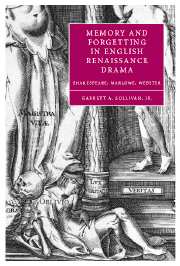Book contents
- Frontmatter
- Contents
- Acknowledgments
- Introduction: planting oblivion
- 1 Embodying oblivion
- 2 “Be this sweet Helen's knell, and now forget her”: forgetting and desire in All's Well That Ends Well
- 3 “If he can remember”: spiritual self-forgetting and Dr. Faustus
- 4 “My oblivion is a very Antony”
- 5 Sleep, conscience and fame in The Duchess of Malfi
- 6 Coda: “Wrought with things forgotten”
- Notes
- Index
- Cambridge Studies in Renaissance Literature and Culture
3 - “If he can remember”: spiritual self-forgetting and Dr. Faustus
Published online by Cambridge University Press: 09 October 2009
- Frontmatter
- Contents
- Acknowledgments
- Introduction: planting oblivion
- 1 Embodying oblivion
- 2 “Be this sweet Helen's knell, and now forget her”: forgetting and desire in All's Well That Ends Well
- 3 “If he can remember”: spiritual self-forgetting and Dr. Faustus
- 4 “My oblivion is a very Antony”
- 5 Sleep, conscience and fame in The Duchess of Malfi
- 6 Coda: “Wrought with things forgotten”
- Notes
- Index
- Cambridge Studies in Renaissance Literature and Culture
Summary
In the opening monologue in which he urges himself to “Settle [his] studies … and begin / To sound the depth of that [he will] profess,” Dr. Faustus skims across the surfaces of logic, medicine, and law before asserting that “divinity is best.” Soon, however, Faustus rejects religious study, shaken by his reading in Romans 6: 23 that “The reward of sin is death,” then in 1 John 1: 8 that all humans are sinners. These readings precede and catalyze his embrace of the “metaphysics of magicians” (1. 1. 49), for, rather than sin and death, necromantic texts offer him “a world of profit and delight, / Of power, of honour, and omnipotence” (53–54). Critics have long pointed out what would have been obvious to an early modern audience, that in his scrutiny of Jerome's Bible Faustus stops short. His hasty summation and rejection of various forms of study are mirrored at the level of the scriptural text by his premature repudiation of Christianity, an action predicated upon an incomplete reading of Romans 6: 23 that effaces the possibility of salvation. This repudiation marks Faustus as a “learned fool,” one for whom “Simple, plain truths” are precisely the ones he “can neither see nor hear.” In relation to Faustus's incomplete reading of Romans, Judith Weil asks a crucial question: “How should we regard a ‘divine in show’ who … seems to be reading St Paul for the first time?” How indeed.
- Type
- Chapter
- Information
- Memory and Forgetting in English Renaissance DramaShakespeare, Marlowe, Webster, pp. 65 - 87Publisher: Cambridge University PressPrint publication year: 2005



